Disclaimer: The information provided in this discussion is for general informational and educational purposes only. It is not intended as medical or professional advice. Only a qualified health professional can determine what practices are suitable for your individual needs and abilities.
Cortisol

What Is Cortisol?
Cortisol is a vital hormone produced by the adrenal glands that assists the body in managing stress, regulating blood sugar levels, metabolism, immune function, memory, and more.
Where Is Cortisol Produced?
Cortisol is a glucocorticoid hormone synthesized and secreted by the adrenal cortex, the outer layer of the adrenal glands. The adrenals are small, triangular glands located above both kidneys.
Functions of Cortisol Some of the main functions of cortisol include:
- Stress response – Cortisol is released following physical or psychological stress as part of the body’s natural fight-or-flight mechanism. It helps restore homeostasis following stress.
- Immune regulation – Cortisol acts to tone down inflammatory and immune processes at healthy levels when necessary.
- Blood sugar control – Cortisol facilitates gluconeogenesis, the production of glucose from proteins and fats, helping maintain steady blood sugar.
- Metabolism – The hormone assists with metabolism of fats, proteins, and carbohydrates.
- Memory formation – Cortisol aids memory consolidation in the brain.
- Cardiovascular function – Cortisol impacts heart rate, circulation, and blood pressure.
What Is a Normal Cortisol Level?
Healthy cortisol levels fluctuate naturally, peaking around 8 am at 15-25 μg/dL, dropping throughout the afternoon and evening, reaching less than 5 μg/dL around midnight.
What Happens If Cortisol Levels Are Abnormal?
Chronically high cortisol can lead to Cushing’s syndrome with symptoms like rapid weight gain, facial rounding, thinning arms/legs, easy bruising, hirsutism, and more. Low cortisol could indicate adrenal insufficiency leading to low energy, nausea, skin discoloration, and blood pressure drops.
Hey there! We hope you love our fitness programs and the products we recommend. Just so you know, Symku Blog is reader-supported. When you buy through links on our site, we may earn an affiliate commission at no extra cost to you. It helps us keep the lights on. Thanks.

